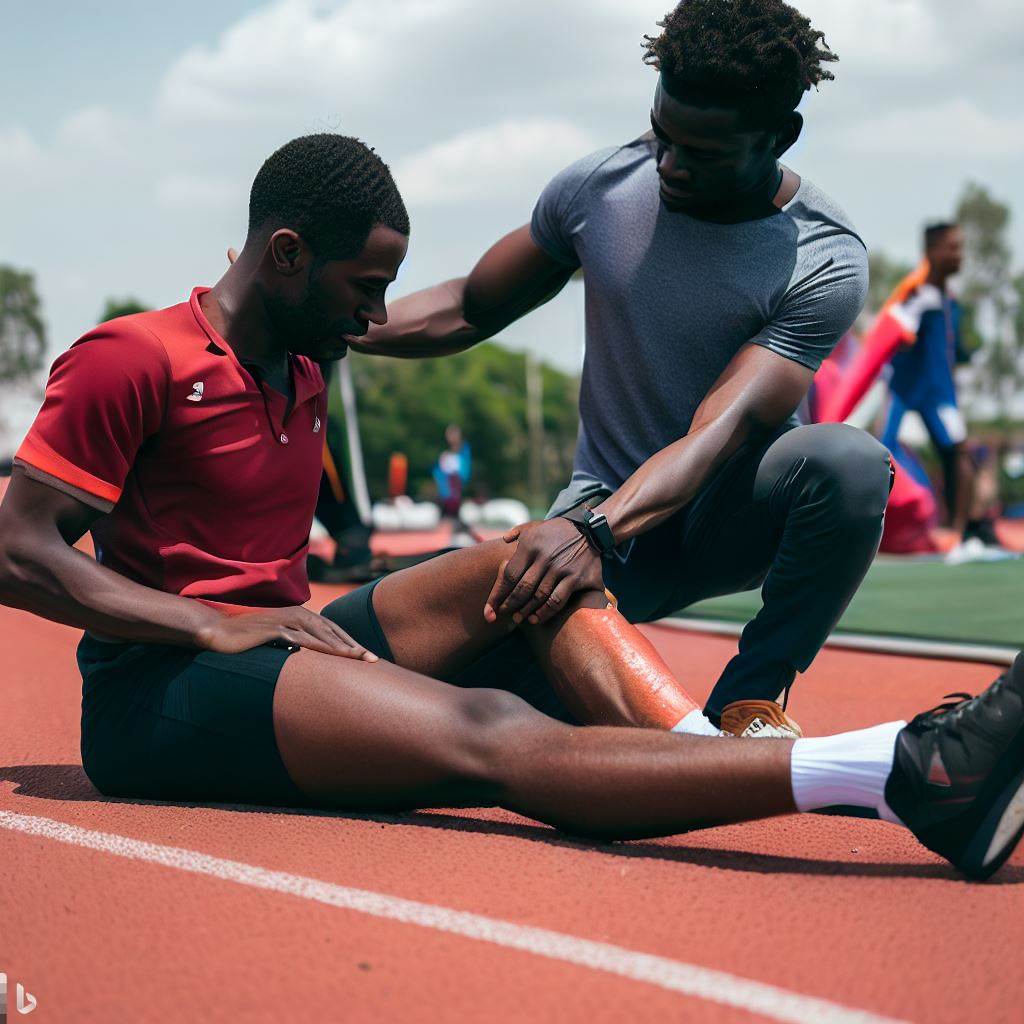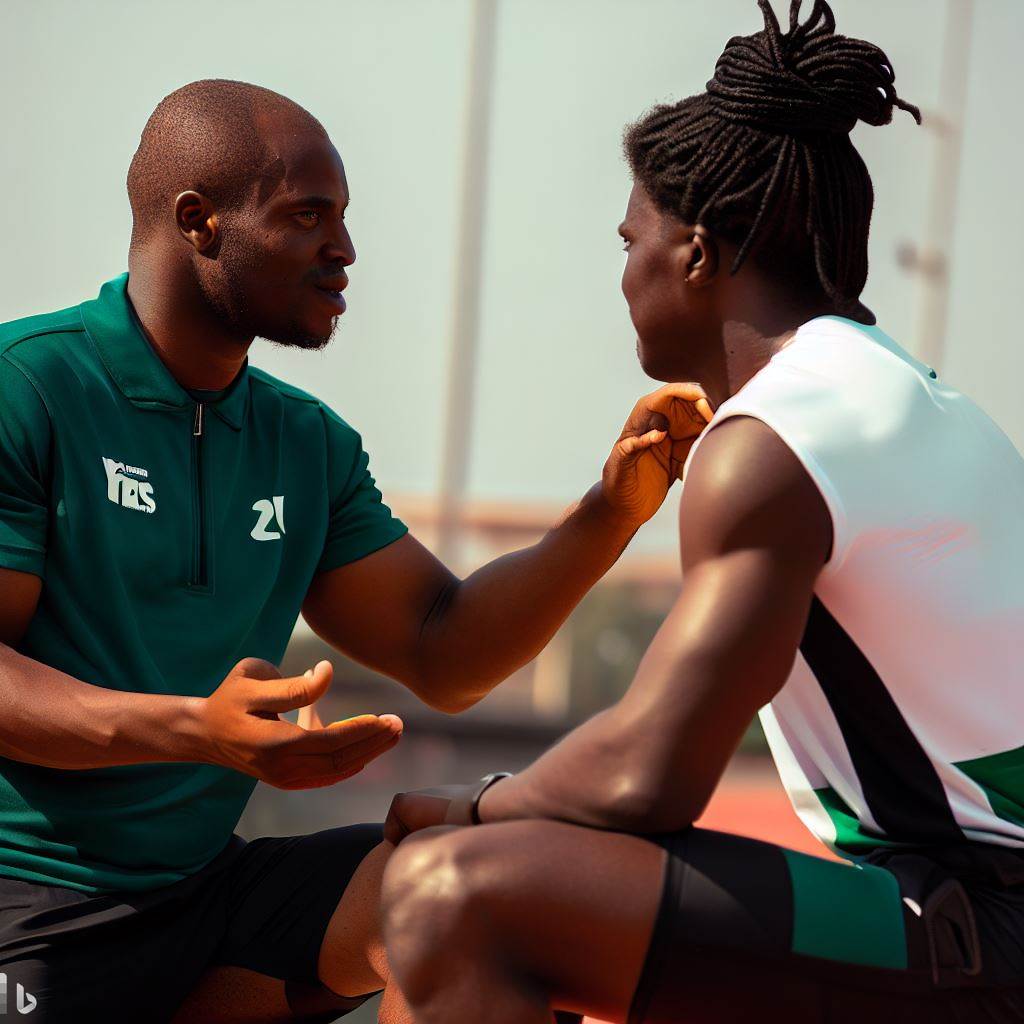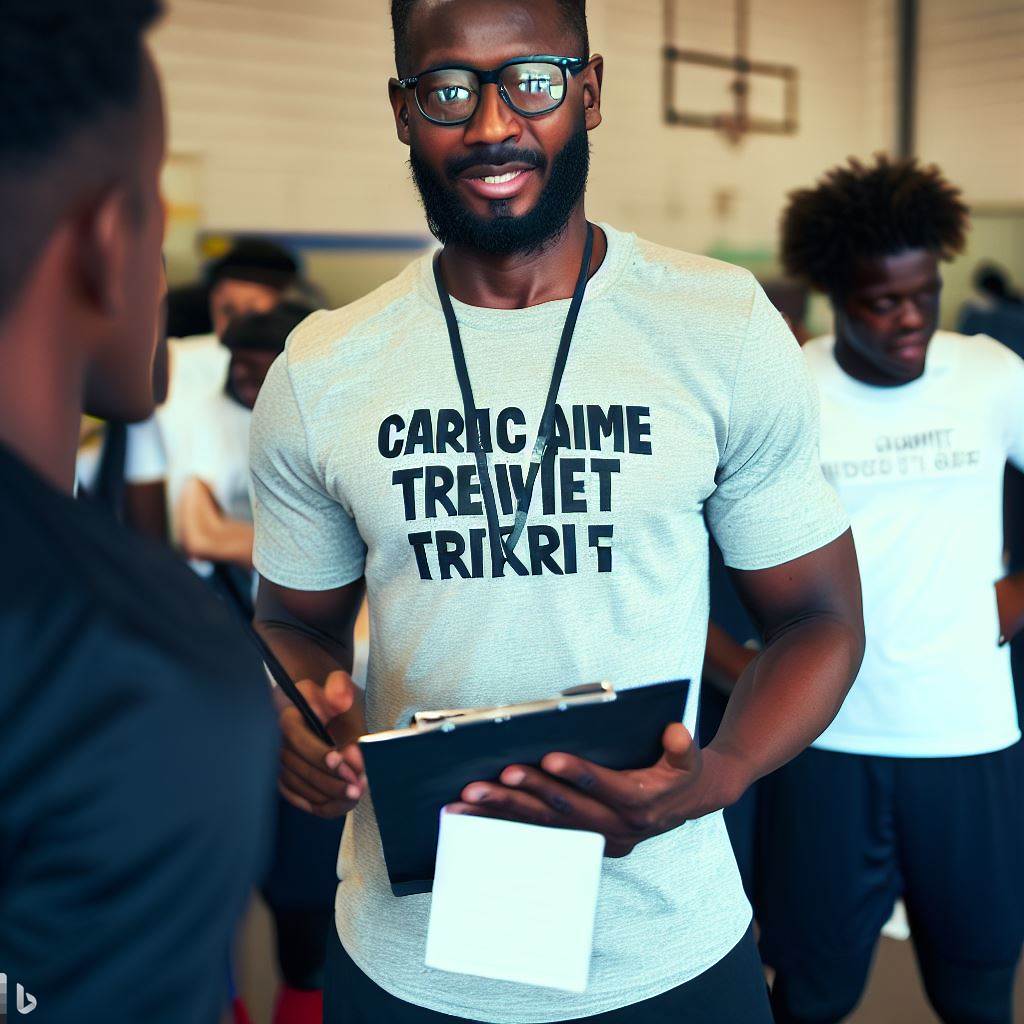Introduction
The athletic trainer profession in Nigeria is a vital component of the sports and physical education industry.
These professionals play a crucial role in the overall well-being and performance of athletes.
Athletic trainers in Nigeria are trained healthcare professionals who specialize in the prevention, evaluation, treatment, and rehabilitation of injuries sustained by athletes.
They work alongside coaches, athletes, and other healthcare professionals to ensure the optimal performance of athletes.
The importance of athletic trainers in sports and physical education cannot be overstated.
They provide immediate and ongoing care to athletes during training, competitions, and recovery periods.
Their expertise helps athletes stay in top physical condition, preventing injuries and optimizing performance.
Athletic trainers also play a pivotal role in injury management.
They conduct thorough evaluations of injuries, provide immediate first aid, and develop individualized treatment plans.
They implement rehabilitation programs that facilitate athletes’ safe return to play and prevent further injuries.
Furthermore, athletic trainers educate athletes on injury prevention techniques, proper nutrition, and conditioning exercises to enhance their overall performance.
They serve as a valuable resource for athletes, coaches, and parents, providing guidance on injury prevention and management strategies.
Most importantly, athletic trainers in Nigeria are integral to the sports and physical education industry.
Their expertise in injury prevention, assessment, and management ensures the well-being and optimal performance of athletes.
Lack of recognition and awareness
Limited Recognition of Athletic Trainers in Nigeria
- Athletic trainers face a major challenge of limited recognition within the healthcare system in Nigeria.
- They are often overlooked and their expertise and skills are undervalued by both the public and healthcare professionals.
- Many people in Nigeria are unaware of the importance and benefits of having athletic trainers as part of the healthcare team.
- This lack of recognition hinders the development and growth of the athletic trainer profession in the country.
Need for Increased Awareness about the Profession
- One of the biggest challenges faced by athletic trainers in Nigeria is the need for increased awareness about their profession.
- Many people confuse athletic trainers with personal trainers or physical therapists, failing to recognize the distinct role they play in healthcare.
- Creating awareness campaigns and educational programs can help bridge this knowledge gap and improve the perception of athletic trainers.
- Highlighting the specific services provided by athletic trainers and their contribution to the overall well-being of athletes can raise awareness.
Misconceptions Surrounding the Role of Athletic Trainers
- A common misconception in Nigeria is that athletic trainers only work with professional athletes, ignoring their role in preventing and treating injuries in all individuals.
- Another misconception is that athletic trainers solely focus on physical fitness, disregarding their expertise in injury assessment, rehabilitation, and emergency response.
- Correcting these misconceptions is crucial to gaining recognition for athletic trainers and ensuring the proper utilization of their skills and knowledge.
- Engaging in public outreach programs, seminars, and media campaigns can help dispel these misconceptions and foster a better understanding of the athletic trainer profession.
In essence, the athletic trainer profession in Nigeria faces significant challenges related to recognition and awareness.
The limited recognition within the healthcare system, the need for increased awareness, and the misconceptions surrounding the role of athletic trainers all hinder their growth and proper utilization.
By addressing these challenges through awareness campaigns, educational programs, and public outreach, Nigeria can overcome these obstacles and pave the way for the advancement of athletic trainers in the country’s healthcare system.
Read: Top Athletic Training Schools in Nigeria: A Comprehensive List
Limited resources and infrastructure
List of Challenges Faced by Athletic Trainers due to Limited Resources
- Lack of adequate funding for athletic training programs hinders their development and growth.
- Inadequate availability of necessary sports medicine equipment and supplies limits their ability to provide quality care.
- Shortage of qualified athletic trainers due to limited resources affects athletes’ well-being and performance.
- Dearth of research opportunities in athletic training due to insufficient resources limits professional development.
- Challenges in conducting effective injury prevention and rehabilitation programs without proper resources.
Insufficient Funding for Athletic Training Programs
The athletic trainer profession in Nigeria faces a significant challenge in terms of limited funding for their training programs.
As athletic trainers play a crucial role in promoting the health and well-being of athletes, it is essential to invest in their education, research, and development.
However, inadequate funding prevents the establishment of quality educational programs and restricts the availability of advanced training opportunities.
This lack of financial support not only affects aspiring athletic trainers but also hampers the growth and recognition of the profession as a whole.
Without proper funding, it becomes challenging to attract and retain qualified trainers, which ultimately impacts the quality of care received by athletes.
Lack of Proper Healthcare Facilities and Equipment for Athletic Trainers
An additional challenge faced by athletic trainers in Nigeria is the lack of proper healthcare facilities and equipment.
Without access to adequate medical facilities, trainers are limited in their ability to provide comprehensive care to athletes.
This shortage of resources compromises the trainers’ effectiveness and jeopardizes the health of the athletes they support.
Furthermore, the absence of essential sports medicine equipment and supplies presents a significant hurdle for athletic trainers.
From taping and bracing materials to rehabilitation tools, these resources are critical for effective injury prevention, diagnosis, treatment, and rehabilitation.
The lack of these resources not only hinders the progress of athletic trainers but also puts athletes at a higher risk of sustaining injuries.
In general, the athletic trainer profession in Nigeria faces significant challenges due to limited resources and infrastructure.
The insufficient funding for athletic training programs hampers their growth and affects the quality of care provided to athletes.
Additionally, the lack of proper healthcare facilities and equipment further diminishes athletic trainers’ ability to effectively perform their duties.
To overcome these challenges, it is crucial for the government and relevant stakeholders to allocate appropriate funding and resources to support the development and advancement of the athletic trainer profession in Nigeria.
Read: Salaries of Athletic Trainers in Nigeria: What to Expect
Inadequate education and training opportunities
When it comes to the athletic trainer profession in Nigeria, one of the major challenges faced is the inadequate education and training opportunities available.
This limitation in educational programs for aspiring athletic trainers has a significant impact on the overall development of the profession.
In order to address this challenge, there is a need to focus on several key aspects.
Limitations in educational programs
- Insufficient number of universities offering athletic training programs restricts the accessibility for aspiring trainers.
- Lack of awareness and recognition of athletic training as a profession further hinders the development of relevant educational programs.
- Inadequate funding for athletic training programs leads to a lack of resources and faculty members.
- Outdated curriculum and teaching methods fail to provide aspiring trainers with the necessary skills and knowledge.
Need for specialized courses and programs
- Introducing specialized courses in athletic training within existing sports science programs can help address the limitations.
- Collaboration with international athletic training organizations can facilitate the development of specialized programs.
- Emphasizing practical training and internships can bridge the gap between theoretical knowledge and real-world application.
- Integration of sports medicine and rehabilitation into athletic training programs can enhance the quality of education.
Importance of continuous professional development
- Continuous professional development programs are essential to keep athletic trainers updated with the latest advancements in the field.
- Regular workshops, seminars, and conferences can provide opportunities for trainers to expand their knowledge and skills.
- Support from athletic training organizations and professional associations can promote continuous learning and growth.
- Mentorship programs can play a crucial role in guiding aspiring trainers and helping them excel in their careers.
Inadequate education and training opportunities pose a significant challenge for the athletic trainer profession in Nigeria.
To overcome this challenge, it is crucial to address the limitations in educational programs, introduce specialized courses, and emphasize continuous professional development.
By investing in quality education and training, Nigeria can nurture a skilled workforce of athletic trainers who can contribute to the overall development of sports and athletes in the country.
Read: Becoming an Assistant Coach in Nigeria: A Guide

Cultural and societal barriers
When it comes to the athletic trainer profession in Nigeria, cultural and societal barriers pose significant challenges.
In this section, we will explore the impact of cultural beliefs and norms, the challenges faced by female athletic trainers in a male-dominated society, and the importance of cultural sensitivity and awareness in promoting the profession.
1. Impact of Cultural Beliefs and Norms
- Cultural beliefs and norms can greatly influence the acceptance of athletic trainers in Nigeria.
- Traditional values may prioritize alternative healing methods over modern sports medicine practices.
- Some communities may view athletic trainers as unnecessary or even suspicious.
- Education and awareness campaigns can help dispel misconceptions and gain community trust.
2. Challenges Faced by Female Athletic Trainers
- In a male-dominated society, female athletic trainers encounter unique obstacles.
- Traditional gender roles and stereotypes can limit opportunities and professional growth.
- Females may face resistance and skepticism due to perceived lack of physical strength.
- Supportive mentorship programs and initiatives can empower female athletic trainers.
3. Importance of Cultural Sensitivity and Awareness
- Cultural sensitivity is crucial for athletic trainers to succeed in Nigeria.
- Awareness of local customs and traditions helps build trust and stronger relationships.
- Respecting cultural practices demonstrates professionalism and enhances acceptance.
- Collaboration with community leaders can pave the way for professional integration.
- Cultural competency training should be incorporated into athletic training programs.
In essence, the athletic trainer profession in Nigeria faces significant challenges due to cultural and societal barriers.
Cultural beliefs and norms can impact the acceptance of athletic trainers, while female athletic trainers face additional hurdles in a male-dominated society.
To promote the profession, it is crucial to prioritize cultural sensitivity and awareness.
By understanding and respecting local customs, athletic trainers can overcome resistance, gain community trust, and enhance acceptance.
Collaboration with community leaders and implementing cultural competency training are essential steps towards a more inclusive and successful athletic trainer profession in Nigeria.
Read: Becoming an Athletic Trainer in Nigeria: A Step-by-Step Guide
Lack of policy and regulatory framework
The athletic trainer profession in Nigeria faces numerous challenges, one of them being the absence of specific policies and regulations.
This lack of a clear framework creates various issues within the profession.
In this section, we will discuss the implications of this challenge and highlight the need for standardized guidelines and licensure requirements.
Absence of Specific Policies and Regulations
One of the significant challenges faced by athletic trainers in Nigeria is the absence of clear policies and regulations tailored to their profession.
Unlike other healthcare professions, such as doctors or nurses, there is no specific legislation or framework governing the practice of athletic training.
This absence creates a sense of ambiguity and uncertainty regarding the roles and responsibilities of athletic trainers.
Without proper guidelines, it becomes challenging for practitioners to establish their professional identity and contribute effectively to the healthcare system.
Need for Standardized Guidelines and Licensure Requirements
To address the challenges faced by athletic trainers in Nigeria, there is an urgent need for standardized guidelines and licensure requirements.
These would provide a clear roadmap for professionals to follow, ensuring their practice aligns with established standards of care.
Standardized guidelines would outline the scope of practice for athletic trainers, specifying the services they can provide and defining their professional boundaries.
This clarity would not only enhance the quality of care but also facilitate collaboration with other healthcare professionals, fostering a multidisciplinary approach to patient management.
Licensure requirements are another crucial aspect that needs attention.
The establishment of a licensing board or authority responsible for issuing licenses to qualified athletic trainers would help regulate the profession.
This would ensure that only competent individuals, who have met the necessary educational and experiential criteria, are allowed to practice.
License requirements would also include the need for continuing education and professional development.
By mandating ongoing learning, athletic trainers would stay up-to-date with the latest advancements in their field, further enhancing the quality of care they provide.
Potential Benefits of Implementing Policies
The implementation of specific policies and regulations for athletic trainers would bring several benefits to the profession and the healthcare system as a whole.
Firstly, it would provide legitimacy and recognition to athletic trainers as essential healthcare providers.
With clear guidelines in place, athletic trainers would gain the respect and trust of both patients and other healthcare professionals.
This recognition would lead to increased collaboration and integration of athletic trainers into the broader healthcare system, ultimately improving patient outcomes.
Furthermore, policies and regulations would ensure that athletic trainers meet certain competency standards.
This would enhance the professionalism and credibility of the athletic trainer profession in Nigeria, attracting more individuals to pursue careers in this field.
In short, the lack of specific policies and regulatory frameworks poses a significant challenge to the athletic trainer profession in Nigeria.
The establishment of clear guidelines and licensure requirements is crucial to ensure the quality and professionalism of athletic trainers.
By addressing this challenge, Nigeria can enhance the delivery of healthcare services and provide proper recognition to the crucial role athletic trainers play in the overall well-being of athletes and the general population.
Advocacy and Collaboration
In order to address the challenges faced by athletic trainers in Nigeria, advocacy and collaboration play a crucial role.
Here are some key points to consider:
1. Importance of Advocating for the Athletic Trainer Profession in Nigeria
- Advocacy is essential to raise awareness about the athletic trainer profession in Nigeria.
- By advocating for the profession, it helps to educate the public and stakeholders about the vital role of athletic trainers in the healthcare system.
- Promoting the profession through advocacy can lead to increased recognition, appreciation, and support from various sectors.
- Advocacy efforts can contribute to the establishment of standardized guidelines and regulations for athletic trainers in the country.
- Furthermore, advocacy can help ensure the inclusion of athletic trainers in policies related to sports injuries and athlete healthcare.
2. Significance of Collaboration with Sports Organizations, Educational Institutions, and Healthcare Providers
- Collaboration with sports organizations allows athletic trainers to have direct involvement in athlete care and injury prevention.
- Working closely with educational institutions enables athletic trainers to mentor and train future professionals, promoting the growth of the field.
- Collaboration with healthcare providers ensures a comprehensive and interdisciplinary approach to athlete healthcare.
- Healthcare providers can benefit from the expertise of athletic trainers in managing sports-related injuries and optimizing athlete performance.
- Through collaboration with various stakeholders, athletic trainers can develop networks and partnerships that enhance their professional opportunities.
3. Role of Professional Associations in Supporting Athletic Trainers and Their Professional Growth
- Professional associations play a vital role in providing a platform for athletic trainers to connect, learn, and grow.
- These associations offer continuing education opportunities, enabling athletic trainers to stay updated with the latest advancements in their field.
- Through professional associations, athletic trainers can access resources, research, and guidelines that enhance their practice.
- These associations also advocate for the recognition and regulation of the athletic trainer profession at a national level.
- Furthermore, professional associations support athletic trainers in promoting their expertise and advocating for better working conditions.
In general, advocating for the athletic trainer profession in Nigeria is crucial for its growth and recognition.
Collaboration with sports organizations, educational institutions, and healthcare providers complements advocacy efforts and strengthens the role of athletic trainers.
Additionally, professional associations provide the necessary support and resources for athletic trainers to excel in their careers.
By working together and advocating for the profession, the challenges faced by athletic trainers in Nigeria can be overcome, leading to improved healthcare for athletes and the broader community.
Gain More Insights: The Role of a Sports Agent in Nigeria: An In-Depth Look
Conclusion
In summary, athletic trainers in Nigeria face several challenges in their profession.
One key challenge is the lack of recognition and support from the government and sports organizations.
This results in limited resources and funding for training and development.
Another challenge is the lack of proper infrastructure and medical equipment, making it difficult for athletic trainers to provide quality care to athletes.
Additionally, the limited number of qualified trainers and the absence of standardized education and certification programs further hinder the profession.
To address these challenges, it is crucial to highlight the potential solutions and improvements needed in the athletic trainer profession.
This includes advocating for government recognition and support, increased funding for training and infrastructure, and the establishment of standardized education and certification programs.
Furthermore, it is essential for readers to support and promote the growth of athletic trainers in Nigeria.
This can be done by spreading awareness about the importance of athletic trainers in sports, advocating for improved working conditions and resources, and encouraging young individuals to pursue a career in this field.
With the collective efforts of the government, sports organizations, and individuals, the athletic trainer profession in Nigeria can overcome its challenges and thrive.
By providing proper recognition, resources, and support, we can ensure the well-being and optimal performance of athletes, ultimately contributing to the overall growth and success of sports in Nigeria.




